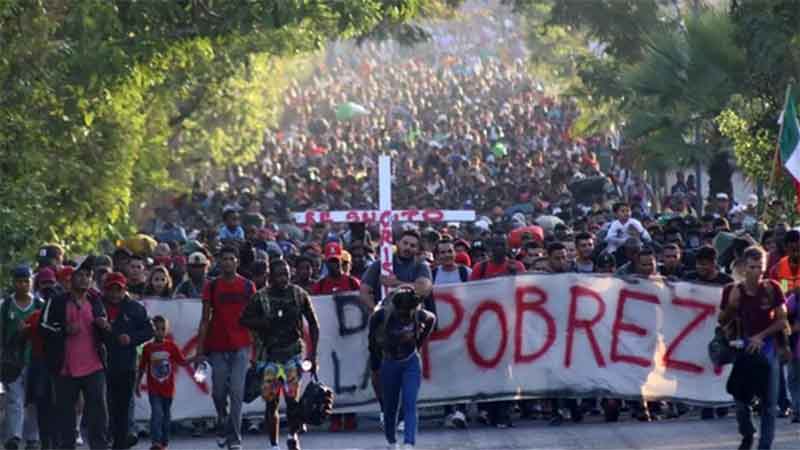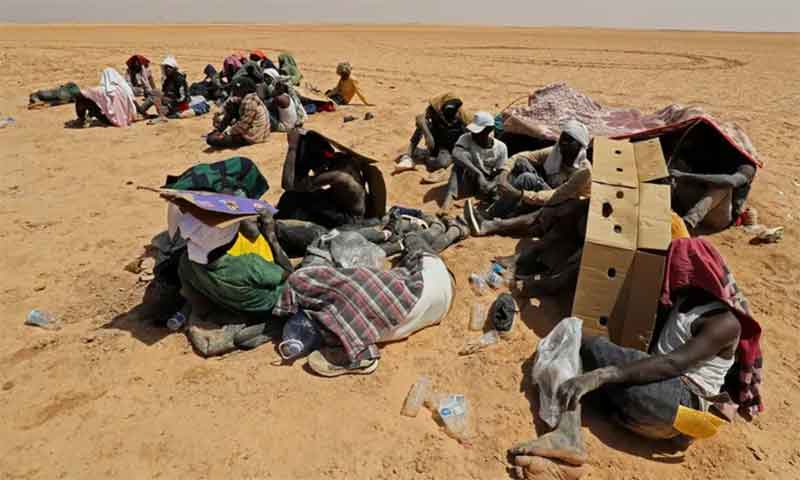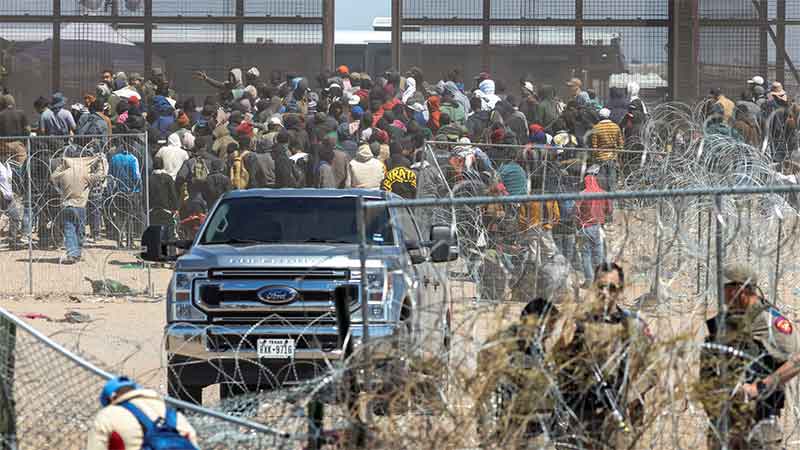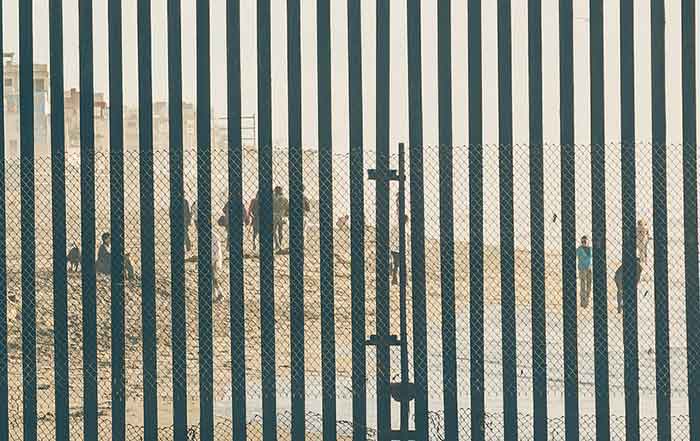
Thousands of migrants and asylum seekers moved slowly north across the southern Mexican state of Chiapas on Tuesday in a caravan hoping to reach the U.S. border, one day before top U.S. officials planned to visit Mexico to discuss migration.
On Wednesday, migrants and asylum seekers, many carrying small children, walked along the highway near the southern Mexican city of Villa Comaltitlán. Some held a banner reading “Exodus from poverty.”
The migrants passed by Mexico’s main inland immigration inspection point outside the town of Huixtla, in southern Chiapas state. National Guard officers there made no attempt to stop the estimated 6,000 members of the caravan.
An AP report said:
The migrants were trying to make it to the next town, Villa Comaltitlan, about 11 miles (17 kilometers) northwest of Huixtla.
In the past, Mexico has let migrants go through, trusting that they would tire themselves out walking along the highway. No migrant caravan has ever walked the 1,000 miles (1,600 kilometers) to the U.S. border.
Under a beating sun, thousands of migrants in a caravan continued to trudge through southern Mexico on Tuesday, with some saying they expect nothing good from an upcoming meeting this week between American and Mexican officials about the migrant surge at the U.S. border.
U.S. officials are expected to press Mexico to stop more migrants at a meeting scheduled for Wednesday.
The meeting “will be between fools and fools, who want to use women and children as trading pieces,” said migrant activist Luis García Villagrán, one of the organizers of the caravan. “We are not trading pieces for any politician.”
“What Mexico wants is the money, the money to detain and deport migrants,” Villagrán said.
Mexican President Andrés Manuel López Obrador confirmed last week that U.S. officials want Mexico to do more to block migrants at its southern border with Guatemala, or make it more difficult to move across Mexico by train or in trucks or buses — a policy known as “contention.”
But the president said that in exchange, he wants the U.S. to send more development aid to migrants’ home countries, and to reduce or eliminate sanctions against Cuba and Venezuela, noting “that is what we are going to discuss, it is not just contention.”
The caravan started out on Christmas Eve from the city of Tapachula, near the border with Guatemala, and migrants spent Christmas night sleeping on scraps of cardboard or plastic stretched out under awnings, in tents, or on the bare ground.
The AP report said:
Some on the caravan, like Norbey Díaz Rios, a migrant from Colombia, said turning back was not an option. Díaz Rios, 46, said he left his home because of threats from criminal gangs, and plans to ask for asylum in the U.S.
“You know that you are walking for a purpose, with a goal in mind, but it is unsure if you are going to make it, or what obstacles you will find along the way,” said Díaz Rios. “I cannot return to Colombia.”
“They should give me a chance to remain in a country where I can get papers and work and provide for my family,” he added.
U.S. Secretary of State Antony Blinken, Homeland Security Secretary Alejandro Mayorkas and White House homeland security adviser Liz Sherwood-Randall will travel to Mexico City for the talks.
This month, as many as 10,000 migrants were arrested daily at the southwest U.S. border.
The Mexican government felt pressure to address that problem, after U.S. officials briefly closed two vital Texas railway border crossings, claiming they were overwhelmed by processing migrants.
That put a chokehold on freight moving from Mexico to the U.S., as well as grain needed to feed Mexican livestock moving south. The rail crossings have since been reopened, but the message appeared clear.
The migrants included single adults but also entire families, all eager to reach the U.S. border, angry and frustrated at having to wait weeks or months in the nearby city of Tapachula for documents that might allow them to continue their journey.
Mexico says it detected 680,000 migrants moving through the country in the first 11 months of 2023.
In May, Mexico agreed to take in migrants from countries such as Venezuela, Nicaragua and Cuba who had been turned away by the U.S. for not following rules that provided new legal pathways to asylum and other forms of migration.
But that deal, aimed at curbing a post-pandemic jump in migration, appears to be insufficient as numbers rise once again, disrupting bilateral trade and stoking anti-migrant sentiment.
A Reuters report said:
On Wednesday, Secretary of State Antony Blinken and Homeland Security chief Alejandro Mayorkas will visit Mexico to meet with Mexican President Andres Manuel Lopez Obrador.
The officials will discuss “unprecedented irregular migration in the Western Hemisphere and identify ways Mexico and the United States will address border security challenges,” according to a statement from State Department spokesman Matthew Miller.
The meeting comes a week after U.S. President Joe Biden spoke with Lopez Obrador by telephone, during which the two leaders said that more enforcement was needed at their shared frontier.
Rosa, from El Salvador, said she hoped the officials would ease the suffering of migrants.
“We are looking for something better for our children and our families,” she said as she walked. “I hope this touches their hearts,” she added.
Migrants and asylum seekers transit through Mexico to the U.S. to escape violence, economic distress and negative impacts of climate change, according the United Nations.
Half A Million
The number crossing the perilous Darien Gap straddling Colombia and Central America has topped half a million this year, double last year’s record.
Migrant rights activist Luis García Villagrán criticized the meeting, saying the officials’ main concerns are domestic electoral issues, and that more enforcement efforts aimed at stopping migrants from reaching the U.S. border would only hurt the poorest of the poor.
“They want women and children to be bargaining chips,” he said, speaking alongside the caravan on Tuesday.
“We are not bargaining chips for any politicians.”
Antony Blinken
An AFP report said:
Secretary of State Antony Blinken heads Wednesday to Mexico in hopes of showing headway in tackling surging migration, which has climbed to the top of political headaches for President Joe Biden as he enters an election year.
The unusual Christmas week trip by the top U.S. diplomat was abruptly scheduled as the rival Republican Party presses Biden for a migration crackdown in return for agreeing in Congress to one of his key priorities — support for Ukraine.
Lopez Obrador told reporters Friday that Mexico would “reinforce our plans” to deal with US-bound migrants — few of whom are Mexicans — after his government also said it was at the breaking point on enforcement.
U.S. State Department spokesman Matthew Miller said the US delegation would speak to Lopez Obrador on the “urgent need for lawful pathways and additional enforcement actions” on migration.
Mexico, under agreements with both Biden and his predecessor Donald Trump, has agreed at least temporarily to take in migrants seeking to cross into the United States.
Trump, the frontrunner for the Republican nomination to challenge Biden in November, is again campaigning on stridently anti-immigrant rhetoric, accusing foreigners of “poisoning the blood of our country,” language that critics pointed out was similar to that of Hitler.
The package proposed by Biden to Congress would also fund 1,300 additional Border Patrol agents to help address migration.
The Biden administration has warned that without a deal, Ukraine will soon run out of weapons needed to repel the nearly two-year-old Russian invasion.
Migrants have been fleeing Central American countries ravaged by poverty, violence and disasters worsened by climate change.
In recent months there has also been an uptick in migrants heading through Mexico from Haiti, which has been devastated by gang violence and a lack of a functioning government, and Venezuela, where basic goods have fallen in short supply after years of economic chaos.
Maria Alicia Ulloa, a Honduran who is part of the latest caravan, said that the U.S. and Mexican officials meeting Wednesday should find ways to help the migrants.
“They have to support us because the situation is also critical in our countries,” she said, voicing fears that tougher U.S.-Mexican immigration measures would mean returning to a country beset by crime and unemployment.
“We emigrate with the hope of giving a better life to our children, and a better life to the relatives who remain behind,” she said.
A Mother
A CNN report said:
A mother who fled her native country with two children after one was kidnapped; a woman who was forced to strip down by thieves looking for money; an activist made unemployable by speaking out against her country’s government: These are some of the stories CNN heard outside a shelter for migrants in Eagle Pass, Texas.
On Christmas Eve, dozens of migrants had just arrived at the shelter after being released by immigration authorities on parole. Some of them were waiting outside, as the shelter had no room for the new arrivals.
Silvia del Carmen Flores, 38, sat on the sidewalk with her 3-year-old son, Nikson, on her lap and her 16-year-old daughter, Yolani, nearby. Flores told CNN they had just been released on parole after requesting asylum and were hoping to catch a ride to San Antonio, where they had been told they may be able to stay at a bigger shelter.
Their journey from their native Honduras started on December 12, Flores said. After traveling in buses and taxis through Guatemala and Mexico, they reached the Mexican city of Monterrey. With the last money they had, Flores said, they caught a flight to Piedras Negras, across the border from Eagle Pass. There, they crossed the border at the Rio Grande, at a point where the water was waist-high.
Flores said she had been thinking about leaving Honduras for a while due to the family’s financial situation. Then, two months ago, Yolani was kidnapped and Flores had to pay money to get her back. After that, Flores felt she had no other option than to leave, she said.















































